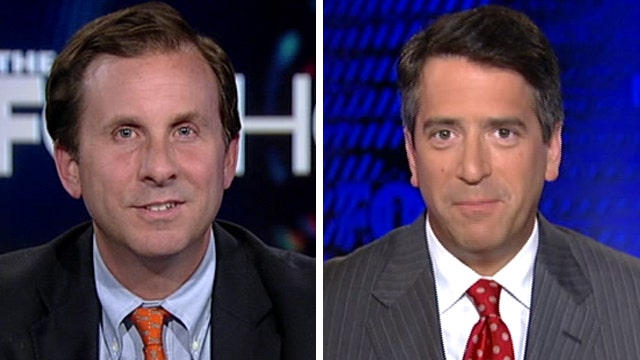Tamny on CNBC, the clarifying moment, and 'Gimme Shelter'
Fox News' James Rosen speaks to 'Popular Economics' author John Tamny
An epiphany, in the stricken, is generally thought to conduce toward a life lived more fully in the open: a breakthrough moment where clarity replaces confusion, and secrecy is jettisoned for the joys of a newly declared alliance with Divinity.
In John Tamny’s case, however, the great moment of clarity – which came to him in the elite precincts of Wall Street – instead produced a fit of stealth. "I was sitting on the floor on the trading floor at Goldman Sachs and they're talking on CNBC about how if the economy keeps growing – remember, this was the late Nineties – it's going to cause inflation," Tamny told me in a recent visit to "The Foxhole."
"I said, 'Wait a second – I grew up in the 1970s I know what inflation is.' It's not the result of too much economic growth; it's the result of devaluation of the currency, which usually leads to slower economic growth because it reduces investment in real economic ideas. And I thought if this is what economists believe, I'm going to make it my life's work to disprove this idea: that somehow prosperity is bad. I started writing surreptitiously for clients at Goldman about the truth on inflation. And I got so excited about it."
Surreptitious e-pamphleteering on the perils of deflationary policies marked the first step down the road that ultimately led Tamny, a political scientist who earned a higher degree at the Vanderbilt Owen Graduate School of Business, to publish "Popular Economics: What the Rolling Stones, Downton Abbey, and LeBron James Can Teach You about Economics" (Regnery, April 2015), which George Will, in his Washington Post column, recently hailed as "cheerful" and "mind-opening."
The idea that economics is too complicated for the average person to understand grates on John Tamny the way whiskey and rye struck Carry Nation, and against that elitist notion the editor of RealClearMarkets swings the metaphorical ax in "Popular Economics."
Taxed at a rate of 83 percent in their native England, Mick Jagger and Keith Richards simply picked up the band and moved to France to commence the lengthy sessions thought by many Stones fans to have produced their crowning masterpiece, "Exile on Main Street" (1972). That’s the kind of simplified example of how economics works – tax a good earner beyond his breaking point and you’ll collect no taxes at all – Tamny thinks average people can readily understand.
ROSEN: So what are we all missing when we all believe that economics is so difficult to understand? How has this great lie been perpetrated upon us?
TAMNY: Well, I think it's been perpetrated by economists who, quite simply, don't understand what they teach. Walter Williams once told me that his professor at UCLA told him, "If you can't explain economic principles to the average person, you don't understand it." […]
ROSEN: What do you regard as, say, the most prevalent economic falsehood under which most Americans, this very moment, are laboring?
TAMNY: I think probably the biggest one is the idea that government has got to stimulate demand and so they must – government must spend with abandon in order to get the economy moving. Let's face it: We are wired to demand things. That's why we get up in the morning. We go to work, we go to school before we get jobs, because we want to exchange the fruits of our labor for all the things that we don't have. Governments never need to stimulate demand. What can they do? The only thing they can do to help an economy grow is stimulate the supply side of the economy, remove the government barriers to our need to produce. And so taxes are a barrier. They're a price placed on work. Regulations restrict our ability to pursue profits. […]
ROSEN: I do know some people who consider themselves, roughly speaking, conservatives on the matter of taxing and spending and who generally favor a leaner federal government, but who nonetheless subscribe to the idea that when the American economy reaches a period of extremis, then it really is imperative that the federal government spend money. So are there certain times when government spending is a better idea than other times?
TAMNY: Never, because it's got to be remembered, governments have no resources. That's not some libertarian slogan, that's just fact. They can only spend what they've taxed or borrowed from us first. And so when you consider government spending during times of hardship, basically what you're doing is moving capital allocation duties to John Boehner and Nancy Pelosi and taking them away from Warren Buffett, Paul Tudor Jones, Jeff Bezos of Amazon, Fred Smith of FedEx. […]
Also the political economy editor at Forbes, Tamny had a ready answer when I put to him the proposition that his prescriptions for growth will be read as "an apologia for the rich." He also had a ready answer when he was asked to name his favorite Rolling Stones tune. From someone who feels so deeply, almost with religious fervor, that taxation represents a stifling form of top-down tyranny, the choice was perhaps not surprising: "Oh, gosh," Tamny said, "'Gimme Shelter,' without question."









































